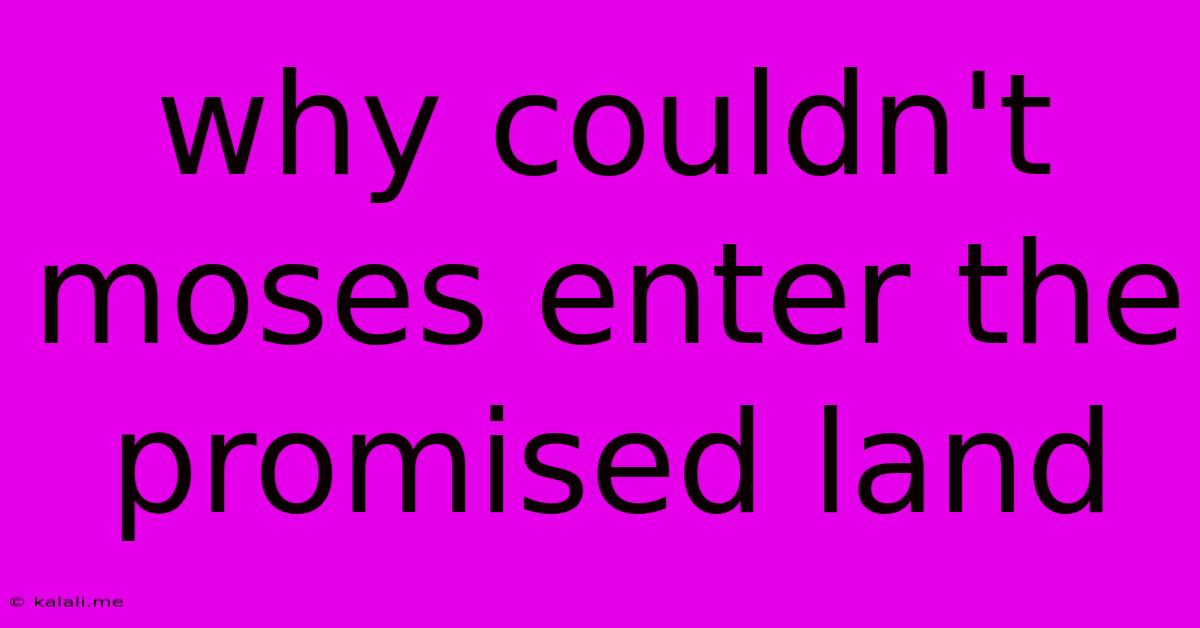Why Couldn't Moses Enter The Promised Land
Kalali
Jun 07, 2025 · 3 min read

Table of Contents
Why Moses Never Entered the Promised Land: A Deeper Look at the Biblical Narrative
The story of Moses leading the Israelites out of Egyptian slavery and towards the Promised Land is one of the most enduring narratives in the Bible. Yet, the dramatic climax sees Moses tragically denied entry into the land he fought so hard to reach. This article delves into the biblical accounts to explore the reasons behind this pivotal event, examining the various interpretations and their theological implications. Understanding this narrative provides crucial insights into the complexities of faith, obedience, and the human condition.
The Incident at Meribah-Kadesh: A Test of Faith and Leadership
The primary reason cited in the Bible for Moses' exclusion from Canaan is the incident at Meribah-Kadesh (Numbers 20:1-13). Exhausted and frustrated by the Israelites' constant complaints and lack of faith, Moses and Aaron failed to properly sanctify God in the eyes of the people. When faced with a water shortage, instead of directly seeking God's guidance through prayer, Moses struck the rock with his rod, a symbolic act that implied a lack of trust in God's ability to provide. God's commandment had been to speak to the rock, symbolizing reliance on divine intervention rather than human action. This act of disobedience, committed in anger and frustration, directly resulted in God's judgment.
More Than Just a Single Act of Disobedience:
While the incident at Meribah-Kadesh is the most prominent reason given, it's crucial to consider the broader context. Moses' leadership, though undeniably monumental, wasn't without its flaws. Throughout his journey, he exhibited moments of impatience, anger, and doubt. These instances, while often understandable given the immense pressure he faced, reveal a vulnerability that contrasted with the divine authority he represented. The Meribah-Kadesh incident can be viewed as a culmination of these recurring patterns, a final transgression that sealed his fate.
Theological Interpretations and Lessons Learned:
Several theological interpretations shed light on the deeper meaning behind Moses' exclusion:
-
The Importance of Obedience: This highlights the absolute necessity of obedience to God's commands, regardless of circumstance. Even the most faithful leader can fall short when obedience falters. This serves as a cautionary tale for all believers.
-
Humility and Dependence on God: Moses' act of striking the rock demonstrated a lack of humility and an overreliance on his own strength and abilities. The narrative underscores the importance of complete dependence on God's power and guidance. True leadership stems from humility and faith.
-
Human Fallibility and Divine Grace: Despite his imperfections and ultimate failure to enter the Promised Land, Moses remains a pivotal figure in biblical history. His story illustrates the reality of human fallibility while simultaneously highlighting God's unwavering grace and forgiveness. Even in moments of failure, God's plan continues.
-
A Symbol of the Limitations of Human Agency: Moses’ inability to enter the promised land could be seen as a reminder that God's plan is ultimately sovereign. Even extraordinary individuals like Moses are subject to limitations.
Conclusion: A Legacy of Faith and Failure
The story of Moses and his exclusion from the Promised Land is a complex and multi-layered narrative. It's not simply a tale of punishment but a profound exploration of faith, obedience, leadership, and the human condition. The incident at Meribah-Kadesh serves as a potent reminder of the consequences of disobedience and the importance of complete reliance on God's grace and guidance. Despite his ultimate failure to enter Canaan, Moses' legacy as a powerful leader and prophet remains an enduring testament to both his extraordinary accomplishments and his profound humanity. His story continues to resonate with believers today, offering valuable lessons on faith, leadership, and the enduring power of God.
Latest Posts
Latest Posts
-
Sql If Temp Table Exists Drop
Jun 07, 2025
-
Grounding Prong Broke Off In Outlet
Jun 07, 2025
-
How To Increase Settlement Size In Fallout 4
Jun 07, 2025
-
Why Would A And Demon Slayer
Jun 07, 2025
-
Can I Use Atf For Power Steering Fluid
Jun 07, 2025
Related Post
Thank you for visiting our website which covers about Why Couldn't Moses Enter The Promised Land . We hope the information provided has been useful to you. Feel free to contact us if you have any questions or need further assistance. See you next time and don't miss to bookmark.